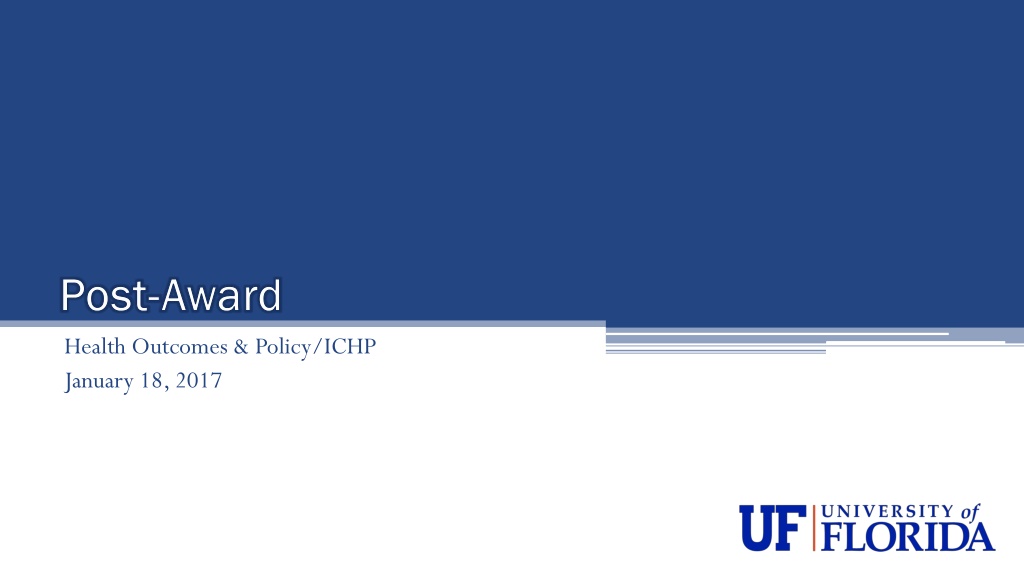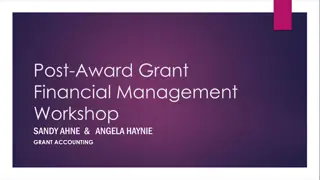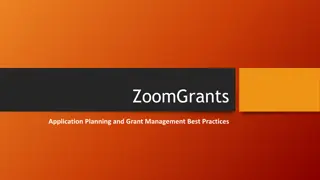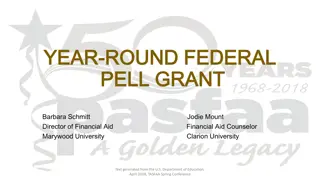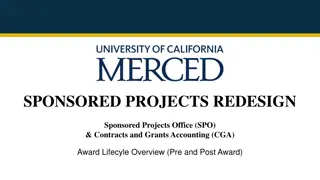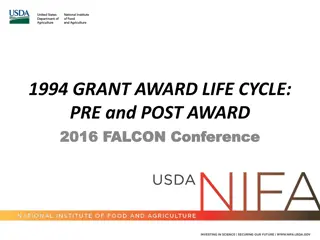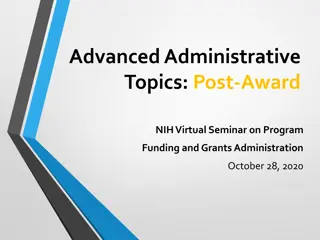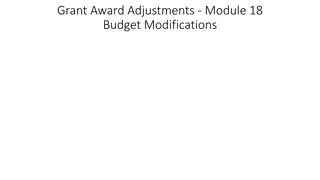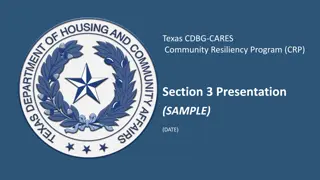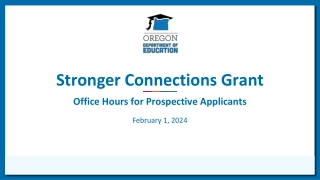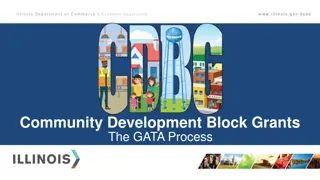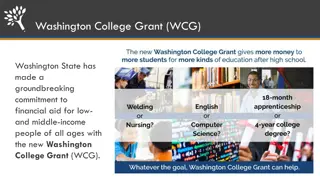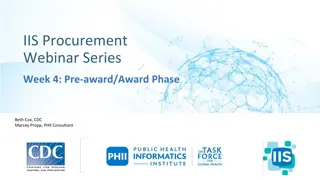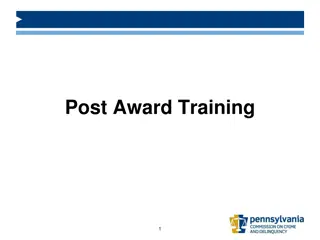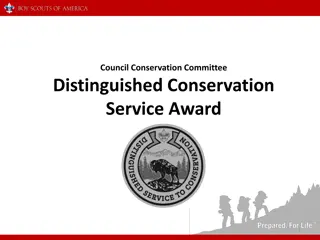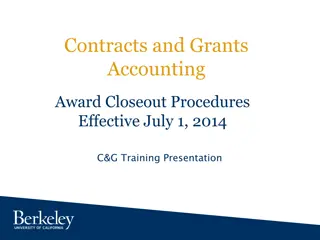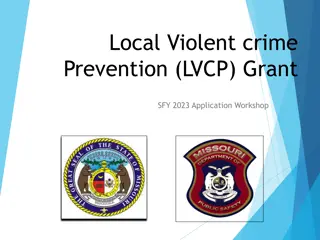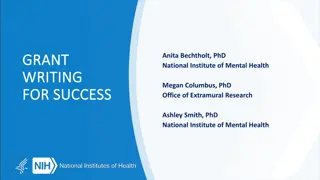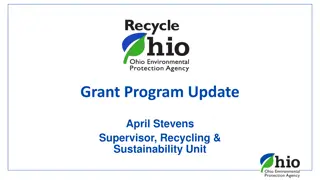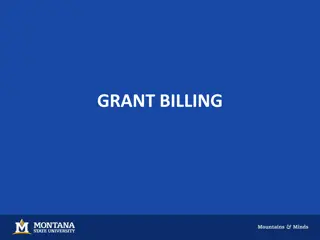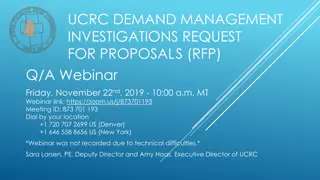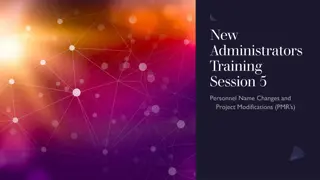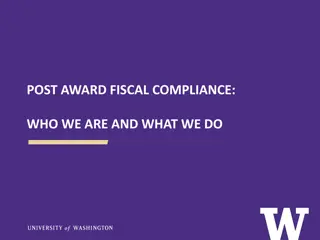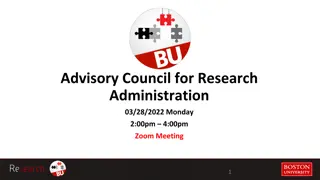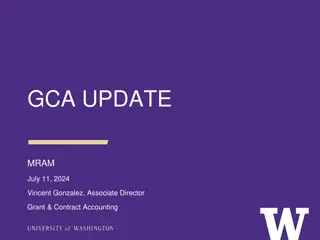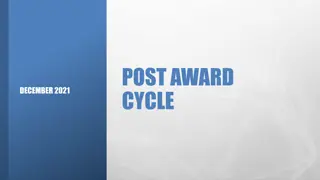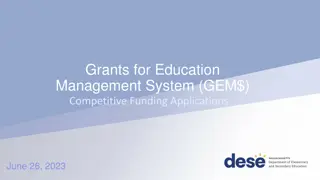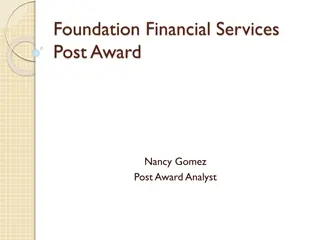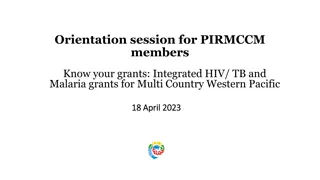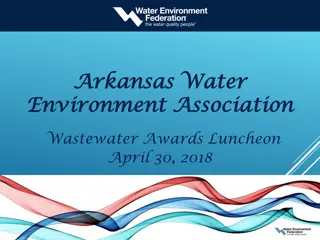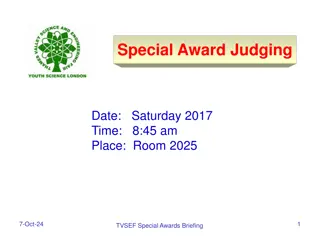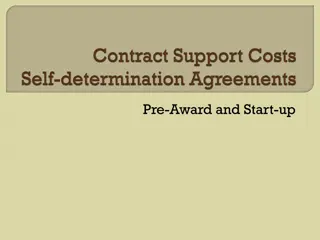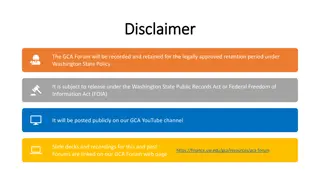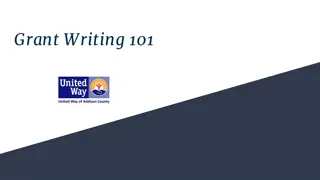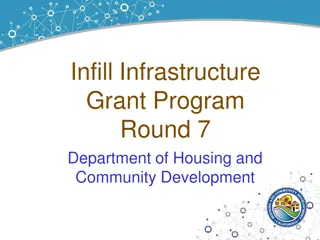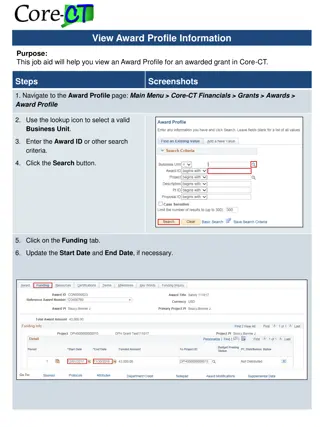Understanding Post Award Processes in Grant Management
Exploring the key differences between pre-award and post-award responsibilities in grant management, this content delves into topics such as Notice of Grant Award (NOA), Fixed Price Awards, and Cost Reimbursable Contracts. By elucidating these concepts, individuals involved in grant administration can gain insights into effective financial management practices for successful project implementation.
Download Presentation

Please find below an Image/Link to download the presentation.
The content on the website is provided AS IS for your information and personal use only. It may not be sold, licensed, or shared on other websites without obtaining consent from the author. Download presentation by click this link. If you encounter any issues during the download, it is possible that the publisher has removed the file from their server.
E N D
Presentation Transcript
Post Post- -Award Award Health Outcomes & Policy/ICHP January 18, 2017
Introduction Introduction In the previous Grants Training Presentation we discussed CAS exemptions, today we will be moving into grants Post Award.
What is the difference between Pre and Post Award? What is the difference between Pre and Post Award? Pre Award Responsibilities (Generally means the activity prior to award establishment in the accounting system) Program Information Proposal Review / Submission Award Negotiations Award Acceptance (Required trainings, Sponsor forms etc.) Post Award Responsibilities: Release Funding Monitor Expenditures Prepares and Submits Invoices Tracking Accounts Receivables/Payables Award Closure
What is an NOA? What is an NOA? Notice of Grant Award (aka NGA) The bridge between Pre-Award and Post-Award A summary of all the information about a particular award funding The information comes straight from the terms of the signed executed agreement Used as the basis for entering the award into UFIRST/PeopleSoft
What is a Fixed Price Award? What is a Fixed Price Award? A project that receives its funding as a set price for service. Here are the Payment Terms available as a fixed Price Award: Payments based on a Specific Schedule/Deliverables Can be a one time payment (Advance Pay) or split into payment by quarter or approved deliverables Typically paid per task/Deliverable Can be paid % of completion or by number of completes (surveys)
What is a What is a Cost Reimbursable Contract? Cost Reimbursable Contract? A project that receives its revenue as expenditures are incurred. (Payment in arrears) Unspent funds are returned (aka de-obligated ) to the Sponsor Billing schedules are determined by the award Billing is most commonly done: Monthly Quarterly Annually Payment Options Include: Letter of Credit (LOC) Direct Draw-Down from Funding Agency Financial Reports are used. Examples include form: SF-425 (Federal Financial Report Form) NON Letter of Credit (NON-LOC) Invoice submitted to funding agency on a scheduled basis agreed upon in the contract.
Award Management Tips Award Management Tips Review your award s terms and conditions. The award notification often has details on what kinds of budget items are not allowable, billing/invoicing, deadlines, due dates, and or liquidated damages, carry-forward, no cost extension, deliverable and reporting times/due dates. Ensure that costs are consistent with the project deliverable schedule/specific aims/milestones and are incurred between the start and stop dates of the project. Confirm the availability of project funds as needed, but make sure to avoid overspending, which may cause a deficit and limit further spending. (For state federal/private industry sponsor) On a monthly basis, review your sponsored project account summary in case there are ever any errors in your budget, encumbrances, or expenditures. Verify that Electronic Sponsored Project Requests (ESPRs), corrections, and cost transfers are being made in a timely manner. (Corrections, cost transfers, PDRR s, Temp Release Requests) Maintain good documentation in case someone needs to revisit the issue at a later date. (Keep folders for each project, including UFIRST notifications, budget justifications, scope of work, sponsor/internal project correspondents, copies of progress reports, original grant submission documentation
Direct and Indirect Costs Direct and Indirect Costs What are Direct Costs? The costs directly associated with the activities of the project. i.e.: Salary of PI and other investigators Lab Supplies/Materials/Office Supplies Equipment Purchased for this project Travel Animals or Animal Care Patient Support Stipend/Tuition (if allowed by the grant/contract) Data Storage/Server Food and Beverage (if allowed by the grant/contract) Online Trainings Memberships What are Indirect Costs? Indirect Costs or F&A (aka IDC, Overhead, Administrative Costs) The Costs that are indirectly associated with the activities of the project: Paying for Facilities (Places) Building; Building Maintenance; Lights; Insurance Paying for Central Administration (People) HR to run payroll Employer provided Benefits Grants Specialists Legal Counsel Banking At UF, sponsors have agreed to pay % over and above the calculated direct costs Federally Negotiated Standard F&A Rate is 52.5% Please View the following sites for further information. Contracts & Grants (C&G) IDC Page - http://www.cg.cfo.ufl.edu/indirectcostrates.php
Monitoring your award Monitoring your award Grantees are responsible for monitoring the day-to-day operations of their grant. To fulfill their role as a steward of industry sponsor and state and federal funds, NIH and other awarding offices monitor grants to identify potential problems and areas where technical assistance might be necessary. This active monitoring is accomplished through review of reports and correspondence from the grantee, audit reports, site visits, and other information available to NIH. Monthly meetings with fiscal and grants team to track spending, monitor expenditure accuracy to ensure spending is within sponsor/UF guidelines.
Monitoring Expenditures Monitoring Expenditures Applicant organizations are required to have financial systems in place to monitor their grant expenditures. NIH, as well as private state sponsors monitor grantee expenditures under individual grants within each budget period and within the overall project period. The funding that NIH provides for each budget period is based on an assessment of the effort to be performed during that period and the grantee's associated budget, including the availability of "un-obligated" balances. Although NIH allows its grantees flexibility with respect to re- budgeting (see Administrative Requirements Changes in Project and Budget in the NIH Grants Policy Statement), NIH expects the rate and types of expenditures to be consistent with the approved project and budget and may question or restrict expenditures that appear inconsistent with these expectations. (NIH for example does this) State/Private/Industry sponsors use similar assessments to allow budgeting flexibility. For example Agency for Healthcare Administration (AHA) pulls down funding based on actual expenditures so in the event certain awards are not invoiced in full. This limits the funds available to grantees.
Monitoring Expenditures Monitoring Expenditures The Financial and Grants Management Teams review grantee cash expenditure reports to determine whether they indicate a pattern of accelerated or delayed expenditures. Expenditure patterns are of particular concern because they may indicate a deficiency in the grantee's financial management system or internal controls. Accelerated or delayed expenditures may result in a grantee's inability to complete the approved project within the approved budget and period of performance. In these situations, the Principle Investigator may seek additional information from the sponsor for approval to make any necessary and appropriate budgetary changes.
NIH Prior Approval Requests NIH Prior Approval Requests All requests that require prior NIH approval must be made in writing (e-mail is acceptable) to the Grants Management Officer at least 30 days before the proposed change. The request must be endorsed by the Authorized Organization Representative. Failure to obtain required prior approval from the appropriate NIH awarding office may result in the disallowance of costs, termination of the award, or other enforcement action within the NIH's authority.
NIH Reporting Requirements NIH Reporting Requirements NIH requires grantees to submit a variety of reports which are due at specific times during the life cycle of a grant award. All reports must be accurate, complete, and submitted on time. (i.e. Final Financial Report - FRR and Progress Reports - RPPR)
NIH Progress Reports NIH Progress Reports NIH requires grantees to submit Research Performance Progress Reports (RPPR) through the eRA Commons at least annually as part of the non-competing continuation award process. The progress report must be approved by NIH to non-competitively fund each budget period within an approved project period. The RPPR asks grantees about accomplishments towards the goal of the project, plans for the next year of the project, manuscripts and publications produced, personnel who have worked on the project, changes to level of effort of key personnel on the project, actual or planned challenges or delays in the projects and plans for resolving them, significant changes regarding human or animal subjects, inclusion enrollment reports for clinical studies, and more.
State Contract/Industry Sponsor Approvals State Contract/Industry Sponsor Approvals State and Industry sponsor approvals can vary depending on the grantee. These requests are typically reviewed and approved by designated contract managers via email and or amendments which are then routed to UF s division of sponsored programs for AOR approval. Florida DOH state contract guidelines** terms and conditions, budgetary/spending approvals Agency for Health Care Administration (AHCA), Florida Healthy Kids (FHK), Children's Medical Services Network (CMSN), Office of Early Learning (OEL).
NIH Audit Requirements NIH Audit Requirements NIH grantees or sub-recipients that expend $750,000 or more in federal awards during the fiscal year are subject to an audit requirement. Organizations expending less than $750,000 during the fiscal year are not required to have an annual audit for that year, but must make their grant-related records available to NIH or other designated officials for review or audit. Audits shall be completed and submitted to the designated offices shown below within a period that is either the earlier of (1) 30 days after receipt of the auditor's report(s), or (2) nine months after the end of the audit period (i.e., the organization's fiscal year).
Prior Written Approvals NSF Prior Written Approvals NSF When a change requires NSF approval, the request must be submitted electronically via use of NSF s electronic systems. The request should clearly state which budget items, if any, are to be changed and by what amounts, and should explain the reasons for any changes. If a grantee rebudgets funds to support a postdoctoral researcher and the original proposal included a mentoring plan, no further documentation is necessary. If the original proposal did not include a mentoring plan, then the grantee must send the cognizant NSF Program Officer the requisite mentoring plan, as described in GPG Chapter II.C.2.j. If supplemental funding is requested to support a postdoctoral researcher, the guidance in AAG Chapter I.E.4.f should be followed. In all cases, the PI must report on the mentoring activities provided to the individual in the annual and final project reports.
NSF Reporting Requirements NSF Reporting Requirements PIs must use Research.gov to meet all NSF project reporting requirements, including submission of annual, final, and project outcomes reports. NSF requires that all Principal Investigators (PIs) submit annual reports during the course of an award and a final report within 90 days after the expiration of an award. Each report is reviewed by the award's managing Program Officer; only after the Program Officer has reviewed and approved the report has the requirement been met. NSF also requires that PIs submit a non-technical, Project Outcomes Report (POR), for the general public in Research.gov within 90 days after the expiration of an award. This report is submitted and posted on the Research.gov website exactly as submitted, without review by a Program Officer. Its intended audience includes the general public, journalists, Congress and its staffers.
NSF Progress Reports NSF Progress Reports What is Required? NSF requires that all Principal Investigators (PIs) submit annual reports during the course of an award and a final report within 90 days after the expiration of an award. Each report is reviewed by the award's managing Program Officer; only after the Program Officer has reviewed and approved the report has the requirement been met. NSF also requires that PIs submit a non-technical, Project Outcomes Report (POR), for the general public in Research.gov within 90 days after the expiration of an award. This report is submitted and posted on the Research.gov website exactly as submitted, without review by a Program Officer. Its intended audience includes the general public, journalists, Congress and its staffers. When is a Report "due"? When is a Report "overdue?" The annual report is due within the 90 day period before the end of the current budget period for the award; it is overdue the day after that 90 day period ends. The final report is due within the 90 days following the award's expiration; it is overdue after that 90 day period ends. The POR follows the same policies governing Final Reports. Overdue reports will prevent the release of continuing grant increments (CGI) or the awarding of additional funding to the PI and all co-PIs listed on the award that has the overdue report.
NSF Progress NSF Progress Reports Continued Reports Continued What is an Interim Report? An interim report may be submitted at any time during the life of the award to update NSF on what the grant has accomplished. Interim reports do not fulfill the reporting requirements, and most grantees do not need to submit them. If you have a "continuing grant," with increments released annually, an interim report will not release the next increment. For that, you must submit your annual report and have it approved by the managing Program Officer. Does a "no cost extension" affect the reporting requirements? A "no cost extension" adds time to an award, but does not relieve the awardee of reporting requirements. Annual reports are still due every 12 months. When the award finally does expire, the final report and project outcomes report are both due within 90 days. How do I know what to put in my Report? The Project Reporting module in Research.gov can be accessed only by the PI and co-PIs of an award. The module is organized with tabs for each of the components of your report: Accomplishments, Products, Participants, Impact, Changes/Problems, and Special Requirements. The template also allows you to attach PDF documents for images, charts and other supplemental materials; PDF attachments are not permitted for the narrative content of the report. A "Getting Started Guide" for creating (and editing) annual and final reports is available at: http://www.research.gov/common/attachment/Desktop/ProjectReportGettingStartedGuide_general.pdf. (The reporting module can also be used to submit interim reports.)
NSF Progress Reports Continued NSF Progress Reports Continued PIs should enter reporting details under each of the tabs in the Report Content section of the module. Under the Accomplishments tab you will be prompted to enter information about your project (including project goals, major activities, specific objectives, significant results, and key outcomes). For each publication that you list in the Products section, you must indicate whether you acknowledged NSF support in the product and whether it was peer reviewed. (Do not include publications that are outside the scope of NSF's support for the project.) Your report should discuss your broader impact activities such as outreach and mentoring under the Impacts tab. Program Officers will also check the Changes/Problems section to see if you discussed deviations from the original research plan and how you handled any issues that arose with human subjects or vertebrate animals. The Project Outcomes Report serves as a brief summary (200-800 words), prepared specifically for the public, of the nature and outcomes of the project. This report should describe the project outcomes or findings that address the intellectual merit and broader impacts of the work as defined in the NSF merit review criteria. The POR should also contain information about products that have resulted from the award such as collections, data sets, software and educational materials. However, the POR does not need to include a list of publications resulting from the award because NSF automatically imports the citations that you provided as part of your annual and final project reports into Research.gov's Research Spending and Results.
State Contract/Industry Reporting Requirements State Contract/Industry Reporting Requirements The sponsor requires grantees to submit a variety of deliverables and reports which are due at a specific time. Generally executed based on a deliverable schedule/timeline during the life cycle of a grant award. All reports must be accurate, complete and typically approved by the sponsor in effort to be submitted on time.
State/Industry Sponsor Progress Reports State/Industry Sponsor Progress Reports The progress report asks grantees about accomplishments towards the goal and or milestones of the project, plans for the next year of the project, manuscripts and publications produced, personnel who have worked on the project, changes to level of effort of key personnel on the project, actual or planned challenges or delays in the projects and plans for resolving them, significant changes regarding human or animal subjects, inclusion enrollment reports for clinical studies, and more.
NIH Final Invention Statement NIH Final Invention Statement When a grant is completed and a subsequent competing segment is not funded, or when a grant is transferred from one institution to another, a Final Invention Statement and Certification (HHS 568) must be submitted to the NIH within 120 days. For grants that are closing out, the Final Invention Statement and Certification can be submitted along with the other required closeout documents through the eRA Commons. For transfers, the HHS 568 should be submitted directly to the NIH awarding Institute or Center. A downloadable version of the HHS 568 is at : https://grants.nih.gov/grants/hhs568.pdf or: https://s- edison.info.nih.gov/iEdison/hhs568.pdf.
Administration Responsibilities Administration Responsibilities Administration of the award is a team effort consisting of the Principal Investigator (PI) and his/her departmental grant and fiscal administrators, Office of Research, and the University's appropriate fiscal office (Contracts & Grants, EIES, or IFAS). The PI and the University jointly bear the responsibility for proper administration according to the policies and guidelines pertinent to the particular project. The Award Administration office assists in the clarification of regulations.
Responsibilities of the PI Responsibilities of the PI The principal investigator (PI) is responsible for project implementation, assembling the necessary staff, expending the funds, and conducting the project as described in the proposal and agreed to by means of the award notification. The PI must direct the work so that it will be completed within the budget period and with the funds authorized; otherwise, a request for supplemental funds or a no-cost time extension must be initiated. Although there is similarity among the regulations of major funding agencies, researchers should familiarize themselves thoroughly with the regulations applicable to their specific project. The PI may authorize changes when they are in compliance with the agency's cost principles, as well as the State of Florida's fiscal regulations, and if the goods or services are directly related to the sponsored project. Salaries and wages may be authorized by the investigator only if they are in accordance with Cost Accounting Standards. Principal investigators have first line responsibility for ensuring their project budgets are current and up to date for managing expenditures within the fiscal regulations and amounts specified by the sponsor. While the accounting units on campus are responsible for billing the sponsor per the funding terms, the principal investigator must carefully analyze the monthly departmental ledger (DL) and voucher registers (which are used to develop those billings) to see that all items presented are correct and that appropriate funds (cash and budget authority) are available. The investigator also has the responsibility of initiating or coordinating appropriate adjustments as each situation dictates. These responsibilities are reviewed and monitored in conjunction with the fiscal and grants team on a monthly basis, to ensure all awards appropriately managed.
Participant Support Costs Participant Support Costs Some agencies include a budgeting category called participant support costs. This category is normally used only for conference proposals or training proposals and not used in research proposals for general travel to conferences or to bring collaborators together to meet and discuss the project, unless specifically allowed by agency written instructions. Funds provided for participant support may not be used by grantees for other categories of expense without the specific prior written approval of the sponsoring agency. Therefore, UF will establish a separate project to separately account for participant support costs. The National Science Foundation (NSF) does not allow participant support costs to be included in the calculation of F&A costs. This is an NSF rule and not a general rule for all participant support costs. Check your sponsor's guidelines before excluding participant support cost from indirect calculations.
Participant Support Participant Support Costs Continued Costs Continued If you receive Participant Support Costs from the NSF the following rules apply: Participant support costs are direct costs for items such as stipends or subsistence allowances, travel allowances and registration fees paid to or on behalf of participants or trainees (but not employees) in connection with meetings, conferences, symposia or training projects. Funds provided for participant support may not be used by grantees for other categories of expense without the specific prior written approval of the cognizant NSF Program Officer. Therefore, awardee organizations must account for participant support costs separately. Participant support allowances may not be paid to trainees who are receiving compensation, either directly or indirectly, from other Federal government sources while participating in the project. A non-NSF Federal employee may receive participant support allowances from grant funds provided there is no duplication of funding of items and provided no single item of participant cost is divided between his/her parent agency and NSF grant funds.
Participant Support Costs Continued Participant Support Costs Continued Participant support costs are excluded from the MTDC base when calculating F&A costs. This category is NOT used for the following, unless specifically allowed by sponsor written instructions or sponsor prior approval: For general travel to conferences or to bring collaborators together to meet and discuss the project For payments to participants in human subject research studies For any other purpose or for non-participant support categories of expense Separate project will be established for Participant Support Costs: When an award is received that includes participate support costs, a separate project must be established to separately account for the participant support costs.
Time and Effort Reporting Time and Effort Reporting Under federal regulations OMB Circular A-21, Section J(8), the University is obligated to document and maintain detailed records of time and effort spent by faculty and staff on activities such as instruction, organized research, departmental research, extension, public service, administration, and so forth. Each academic term, departments electronically report non-academic and academic activity. These reports are used to verify the allowableness of charges to contracts or grants and become part of the basis used to develop the University's indirect cost proposal. Documentation of time and effort activity is required on all contracts and grants regardless of the source of funding and on all other activities that would have an impact on indirect costs. The University must be ready to provide sufficient detail concerning these activities to allow a reviewer to determine whether the work performed benefited sponsored projects. Faculty are reminded to take these reporting duties very seriously.
Closeout Closeout NIH closes out a grant as soon as possible after the project period end date if the grant will not be extended of if continued funding is not provided. Closeout consists of the timely submission of all required reports and adjustments for amounts due the grantee or NIH. Closeout of a grant does not automatically cancel any requirements for property accountability, record retention, or financial accountability. Following closeout, the grantee remains obligated to return funds due as a result of later refunds, corrections, or other transactions, and the federal government may recover amounts based on the results of an audit covering any part of the period of grant support.
Closeout Closeout Required closeout reports include: Final FFR Expenditure data Final progress report Final Invention Statement and Certification Final population tracking data when applicable Instructions for submitting the Final Progress Report are part of the PHS 2590, Section 3. All close out reports are due within 120 days of the end of grant support. Failure to submit timely and accurate final reports may affect future funding to the organization or awards with the same PD/PI.
Record Retention Record Retention Grantees generally must retain financial and programmatic records, supporting documents, statistical records, and all other records that are required by the terms of a grant, or may reasonably be considered pertinent to a grant, for a period of 3 years from the date the annual FFR is submitted. For awards issued under the SNAP authorities, the three-year retention period is calculated from the date the FFR is submitted for the entire competitive segment. Closeout may also affect the time period for retention of records by the grantee, because the three-year record retention period begins with the submission of the final FFR. See 45 CFR Part 74.53 and 45 CFR Part 92.42, Retention and Access Requirements for Records.
IRB Fees IRB Fees Fee Schedule Effective as of September 1, 2015 Type of Submission Trainee Project $1,172 Other Projects $2,344 Initial Review Five-Year Replacement Initial Review Continuing Review Change of Protocol, including changes in PI's $586 $567 $157 $1,172 $1,134 $313
Smart IRB Schedule Smart IRB Schedule NOTE: this schedule is not clear if there is a charge per location, per PI or for the overall study. Type of Submission Fee Schedule Effective as of September 1, 2015 Other Projects this does not include their Trainee Projects which is a study conducted by a resident or fellow and is priced differently. Initial Review $2344 Five-Year Replacement Initial Review $1172 Continuing Review $1134 Change of Protocol, including changes in Principal Investigators $313
Exceptions to UW Health Sciences IRB fee Schedule Exceptions to UW Health Sciences IRB fee Schedule IRB fees will not be applied to the following: Human subjects research that qualifies for exemption. Human subjects research wherein 1) greater than 50% of the funding is provided by federal or other non-industry sources and 2) indirect costs from these sources are 10% or greater. Research studies supported by funding from the Wisconsin Partnership Program or the Institute for Clinical & Translational Research (ICTR). The funding must not be limited support (e.g., funds for equipment or laboratory analyses). Medical records research that is not industry funded. Applications for projects that do not meet the definition of human subjects research (e.g., quality improvement projects). Applications involving the non-research use of a Humanitarian Use Device. Applications for an emergency or one-time use of an investigational drug, biologic, or device. Research studies that primarily involve research activities that are conducted in fulfillment of a University of Wisconsin Madison degree and would not exist or continue without the student s involvement. Note: If a project is designated as both a student and a trainee project, the trainee rate will apply if the study otherwise qualifies for an IRB review fee. Charging IRB fee s to federal awards
Fees for Western IRB review Fees for Western IRB review Combined Fees for WIRB Reviews Effective as of September 1, 2015 Type of Submission UW Insitutional WIRB fee PLUS Compliance Review Fee $1,500 $0 $0 $0 Initial Review Continuing Review Change of Protocol, including changes in PI's Other WIRB reviews and services Per WIRB fee schedule Per WIRB fee schedule Per WIRB fee schedule Per WIRB fee schedule PLUS PLUS PLUS PLUS
WIRB Fees WIRB Fees Services Rendered Cost Initial Review Initial Review of Protocol (Protocol/grant, First Consent Form, Recruitment Materials) Initial Review of Prinicipal Investigator Per Principal Investigator. Includes previously approved consent form(s), site-specific recruitment materials. Additional Consent Form (Each, Per Prinsicpal Investigator) Co-Principal Investigator or Change of Principal Investigator Continuing Review Protocol Renewal Review (At Least Annually) Study Renewal Review (Each Site, At Least Annually) Annual Review of Generic or Non-Protocol Related Material Per item Study Close Out (Each Site) Protocol Close Out (When WIRB is the Central IRB) Other Services Emergency Use of Post-Use Report Reviews; Compassionate Use of a Device New or Modified Generic or Non-Protocol Related Material Per Item WIRB Translation Services Cost based on number of words, minimum translation fee of $165 plus $400 administrative fee IRB File Duplication Requests Request for Board Ackowledgement of Protocol/Study Specific Materials Pre-review of Research (Protocol Development, etc.) Site Visit Board-directed compliance visits and Massachusetts site visits. (In complicance with Massachusetts regulations, WIRB will send a representative to conduct an on-site review within thirty (30) days of the project's approval when the principal investigator has not previously been approved by WIRB for a research project.) $1,340 $1,470 $475 $1,470 $1,340 $1,470 $800 $195 $225 $100 $800 Variable $125 $365 Call for Pricing $1000 + Travel
WIRB Free Schedule: WIRB Free Schedule: as of September 1, 2015 as of September 1, 2015 Initial Review: Initial Review of Protocol (Protocol/grant, First Consent Form, Recruitment Materials) $1,340 Initial Review of Principal Investigator Per Principal Investigator. Includes previously approved consent form(s), site-specific recruitment materials. $1,470 Additional Consent Form (Each, Per Principal Investigator) $475 Co-Principal Investigator or Change of Principal Investigator $1,470 Continuing Review: Protocol Renewal Review (At Least Annually) $1,340 Study Renewal Review (Each Site, At Least Annually) $1,470 Annual Review of Generic or Non-Protocol Related Material Per item $800 Study Close Out (Each Site) $195.00 Protocol Close Out (When WIRB is the Central IRB) $225 Change to Research* Protocol Amendment with Consent Form $675 Change to Research Protocol Amendment without Consent Form $415 Change to Research Revised Consent Form $555 Change to Research Recruitment/Retention Materials and Other Subject Related Material, Additional Location, etc. $270 (per item) Change to Research Review of Revised Product Information (Investigator Brochure, Package Insert, Dear Inv. Letters, etc.) $365 *Charges will be per submission, per PI unless otherwise specified or the items require multiple and substantively independent review (e.g. consistent changes across several documents will receive a single charge; substantively different changes to different documents submitted at the same time but requiring independent review by the Board may receive more than one charge)
No No- -Cost Extensions Cost Extensions A no-cost extension is when a project period is extended (usually for another year) without additional funding from the sponsor. The reasons for a NCE vary and may be due to a delay in the next year of funding or a delay in the research progress. It is especially important to pay attention to when a project is ending so that you can request a no-cost extension in a timely manner. What is the purpose? The No-Cost Extension feature, accessed via eRA Commons, is an electronic means for a grantee organization to electronically submit a notification that they have exercised their one- time authority to extend without funds the final budget period of a project period of a grant. This extension can be up to 12 months in additional time. This assumes all internal review and approval processes at the grantee organization have already taken place.
No No- -Cost Extensions Cost Extensions What are the features? Accessible directly through eRA Commons The link in Status automatically appears 90 days before the project end date An email notification is automatically sent to agency staff when the grantee submits the extension notification Upon receipt of the notification, the budget and project period end dates are updated to reflect the extension of the respective grant record. Who can use the No-Cost Extension feature? Signing Officials at the grantee organization.
Discretionary Fund Mistakes Discretionary Fund Mistakes If award are not received by anticipated begin date or a temp project is not permitted to be put into place, all salary and other expenses will be placed on PI IDC account and potentially cause the balance to run into a negative state. Which could then prevent PI from furthering their research with residual/discretionary funds.
Pre-Award Costs Federal grants expected to be awarded under the Uniform Guidance 2 CFR Part 200.458 allow pre-award spending of up to 90 days prior to the grant s budget period start date. Any period greater than 90-days would require the Federal agencies prior approval. To request pre-award cost be approved, log in to UFIRST-Award and complete the request for pre-award spending. Request for pre-award cost should be made prior to the receipt of the grant, it is the exception to approve pre-award costs after the grant has been received. The request for pre-award costs should include a narrative explaining why the grant needs to begin early, a pre-award budget, the pre-award start date. If Unit Financial Administrator (UFA) will electronic approve and a guarantee the department, center or college will cover all expended funds if for any reason the award is not made to the University. Pre-award costs are only approved when it is made clear that pre-award spending is necessary for the effective and economical conduct of the project. Temporary Release of Funds Investigators often experience difficulties in starting or continuing personnel appointments when an award is assured but the arrival of the award documentation is delayed. To request a Temporary Release of Funding, follow the UFIRST IG: Requesting a New Temporary Release Project
Subawards Subawards A subaward is a component of a sponsored project where another university, company, or organization (known as the sub-recipient) is performing work and is responsible for a portion of the technical work. Please note that when a project is awarded, a subaward is not automatically established. It requires additional steps including contract negotiations with the sub-recipient.
Important Subaward Questions: Important Subaward Questions: Do we have the subawardee s letter of intent (LOI) and statement of work (SOW)? If applicable, do we have the subawardee s current Institutional Rate Agreement (includes F&A and fringe rates & agency)? Do we have the subawardee s budget and budget justification? Do their project dates line up with our awarded project dates? If applicable, do we have the subawardee s conflict of interest (COI) disclosure management or is the subawardee listed on the FDP Clearinghouse?
Participant Support Costs Participant Support Costs Participant support costs are defined by Uniform Guidance 2 CFR 200.75 as direct costs for items such as stipends or subsistence allowances, travel allowances, and registration fees paid to or on behalf of participants or trainees (but not employees) in connection with conferences or training projects. Participant support costs are excluded from the MTDC base when calculating F&A costs. This category is NOT used for the following, unless specifically allowed by sponsor written instructions or sponsor prior approval: For general travel to conferences or to bring collaborators together to meet and discuss the project For payments to participants in human subject research studies For any other purpose or for non-participant support categories of expense Separate project will be established for Participant Support Costs: When an award is received that includes participate support costs, a separate project must be established to separately account for the participant support costs. Agency Guidance: NSF Guidance: Participant Support II.C.2.g(v), II.D.9 NIH Guidance:For the purposes of Kirschstein-NRSA programs, this term does not apply. NIH will continue to use the terms trainees, trainee-related expenses, and trainee travel in accordance with NRSA Regulations.
PI Roles Principal Investigator Proposal Development & Routing Develop proposal in compliance with University, sponsor, state and federal policies and regulations. The technical description of the work, narratives included in support of that description (e.g., budget justifications) and the ability to execute fall to the PI. Identify key personnel and provide reasonable estimate of the effort required to carry out the statement of work. Identify resources required to complete the proposal including personnel, facilities, subrecipients, costs to charge the sponsor and resources to be committed by the PI, department, college, or University. Identify compliance requirements (i.e. human subjects, animals, safety concerns, export requirements and personal conflicts) required to be managed in performance of the project. Complete all required disclosures of Financial Interests and Outside Activities prior to submission of the proposal. Identify type of work to be undertaken to facilitate proper selection of facilities and administration (F&A) rate types and category or purpose for institutional reporting. Certify to the veracity and integrity of the full and complete proposal including technical and financial commitments. Ensure completion by PI and/or study team of all training required for compliance with University, sponsor, state and federal policy and regulations. Ensure the proposal is completed with sufficient lead time to allow for the full and complete review by the Chair, Dean, and DSP outlined below. Prepare responses to Sponsor inquiries during review process (e.g., Just-In-Time [JIT], revised budgets, revised scope of work, etc.)
Project Execution Review and understand each award s conditions. Comply with terms of the award including state and federal laws and regulations, University and sponsoring agency policies and procedures, award specific conditions and requirements, and the scope of work. Oversee the conduct of research in accordance with state and federal laws and regulations and University and sponsoring agency policies and procedures. Oversee the research team to help ensure ethical and compliant conduct in all aspects of the research process including but not limited to the treatment of human subjects and research animals, conflicts of interest, export control, data acquisition, management, sharing and ownership, publication practices, responsible authorship, and collaborative research and reporting. Oversee compliance with technical, progress (including final), and compliance reporting requirements in accordance with University and sponsor policies, and state and federal laws and regulations. Retain project data and materials as required by the award and in compliance with the University of Florida Intellectual Property Policy. Disclose inventions, discoveries, intellectual property, and improvements to the University s Office of Technology Licensing (OTL).
Fiscal Administration of Project Execution Fiscal Administration of Project Execution Understand and apply the cost principles, effort fundamentals and other fiduciary obligations that are agreed to in the acceptance of sponsored funds. Direct the posting of project expenses to the appropriate project in accordance with University and sponsor policies, and state and federal laws and regulations. Coordinate with department administration for a regular (monthly) review of project expenditures to ensure allocability, reasonableness, and necessity of costs. Authorize cost transfers/payments in a timely manner in accordance with University and sponsor policies and state and federal laws and regulations. Coordinate department administration to identify and authorize cost sharing obligations and expenditures, if applicable. Provide oversight for re-budgeting, cost transfers, and carry forwards. Coordinate with department to initiate resolution to any cost overruns. Prepare continuation proposals or technical progress reports in a timely manner.
Subrecipient Monitoring Maintain regular contact with the subrecipient s PI. Monitor subrecipient s technical and programmatic activities. Collect, review and retain subrecipient s technical/performance reports as required by the terms of the subaward. Verify the subrecipient work is conducted in a timely manner and that the results delivered are in line with the statement of work. Review and approve subrecipient invoices/complete payment certifications to ensure the charges are allowable, allocable, reasonable, and within the period of performance. Approve the final invoice only when all required reports have been obtained. Maintain documentation of monitoring. Promptly contact C&G with concerns about subrecipient expenditures or DSP with any indication that the subrecipient is not fulfilling its obligations under the subaward. Effort Reporting Expend effort throughout the life of the project. Provide timely information to departmental personnel to facilitate payroll distribution and changes to distributions. Review charges throughout the life of the project to ensure accuracy. Ensure that PI effort and effort of other individuals working on the project is certified accurately and in a timely manner. Comply with sponsor requirements regarding any significant reductions (normally >25%) in effort commitments on funded sponsored activities. Support and endorse cooperation with University compliance and monitoring efforts related to effort reporting.
